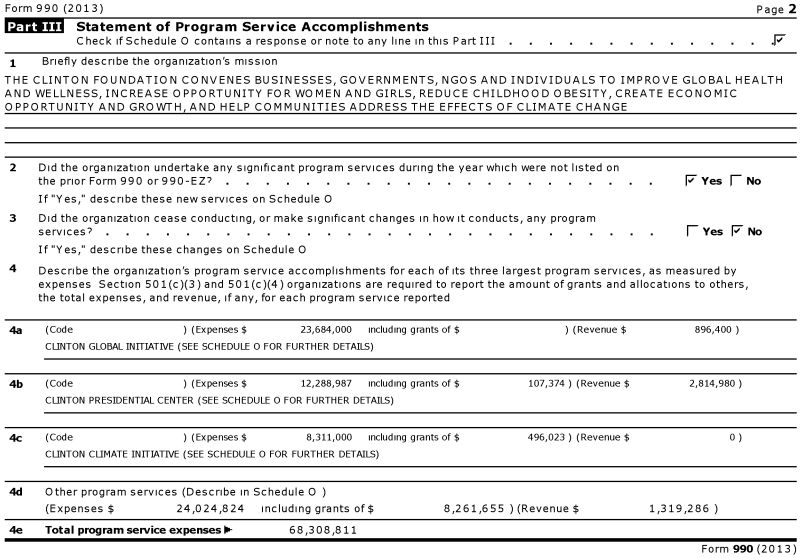The Clinton Foundation is currently under fire for its practice of secretly collecting foreign donations while Hillary Clinton served as Secretary of State and then refusing to disclose the donations as required by law. The tax-exempt non-profit has also been criticized for spending a huge chunk of its money on items like office supplies and travel instead of on charitable grants. An analysis by The Federalist showed that the Clinton Foundation spent less than 10 percent of its budget on charitable grants from 2011 through 2013.
One argument offered by Clinton defenders is that the former first family’s charitable organization isn’t a grant-making foundation and instead chooses to do much of its charitable work in-house. The result, according to these defenders, is that the group’s charitable work won’t really show up on a tax form since the bulk of it is done by salaried employees of the foundation.
There’s only one problem with this rationale: it was resoundingly rejected by Ira Magaziner, the CEO of the Clinton Health Access Initiative and the brains behind the Clinton Foundation. “This is not charity,” Magaziner told The Atlantic in 2007. “The whole thing is bankable. It’s a commercial proposition.”
Magaziner was referring to the energy and climate change activities of the Clinton Foundation. Back in 2007, when Magaziner was interviewed at length about the organization’s activities by reporter Jonathan Rauch, the Clinton Foundation was still a singular entity. It had not yet spun off its pharmaceutical purchasing and distribution business into the separate Clinton Health Access Initiative, or CHAI (CHAI was officially spun off and separated from the Clinton Foundation in January of 2010, according to the group’s tax filings).
By 2012, the Clinton Foundation–the entity that officially added Hillary Clinton to its board in 2013–had ceased its programmatic pharmaceutical efforts entirely. After the 2010 spin-off, CHAI–on whose board Hillary does not sit–took complete control of those activities. The energy and climate efforts, however, stayed with the Bill, Hillary, and Chelsea Clinton Foundation as part of the “Clinton Climate Initiative.”
The Clinton Foundation’s 2013 tax filings characterize the Clinton Climate Initiative as one of the organization’s top charitable programmatic efforts, behind the Clinton Global Initiative (CGI), which focuses almost exclusively on planning and funding CGI’s annual meeting, and the Clinton Presidential Center, which funds the former president’s official library in Little Rock, Arkansas.

In other words, the Clinton Climate Initiative is the only programmatic effort explicitly listed as a “program service accomplishment” in the Clinton Foundation’s 2013 tax filings that doesn’t exist to fund the Clinton presidential library or the Clinton Global Initiative’s conference series.
Here’s how the Clinton Climate Initiative efforts were described in 2007 by Magaziner, the man who first envisioned and implemented them:
But the make-or-break component is a plan to re-equilibrate the market for energy conservation. “What we’re doing is jump-starting— accelerating—market forces,” Magaziner told me.
Cities own public buildings: offices, schools, police stations, hospitals, fire stations. They set codes for private buildings. They buy and run fleets of vehicles: buses, garbage trucks, police cars, ambulances. They handle water and waste. No city by itself can make a deep dent in carbon emissions or reorganize a global market, but together cities can pool their demand for leading-edge conservation technologies, such as LEDs for traffic lights, systems that capture and burn garbage dumps’ waste methane (a potent greenhouse gas), and alternative-fuel engines for city vehicles. Predictable demand would let suppliers scale up their operations, bringing prices down and creating footholds for technologies on the cusp of commercialization.
That would be step one. Step two, in Magaziner’s vision, is to channel a Niagara of private capital into the effort. Energy-saving technologies typically cost more up front but less over time. “So what we’re going to be doing is setting up a financing mechanism,” he told me. The foundation would help cities borrow in the securities markets against future energy savings. “The whole thing is bankable,” Magaziner said. “It’s a commercial proposition. This is not charity.
But are those activities even charitable in nature? Not according to Magaziner, who was described by The Atlantic as “effectively chief executive, strategist, recruiter, and senior negotiator, operating with what appears to be freewheeling authority.”
“[He and I have] worked together long enough so he trusts me,” Magaziner said of Bill Clinton.
Bill Clinton’s right-hand man, the one who helped design and build the Clinton Foundation from the ground up, explicitly stated that the foundation’s efforts are commercial and not charitable in nature. If Bill Clinton trusted him to accurately characterize the foundation’s activities, shouldn’t we?









